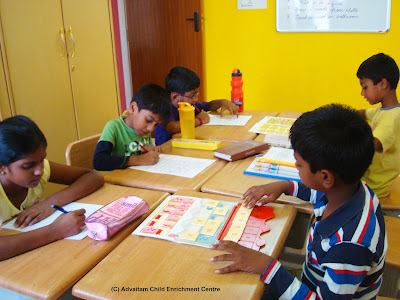Problem solving behaviour in children
Does problem solving come naturally to everyone? I am not sure, over the years I have seen people waiting to get problems solved by someone else and others actually solving problems or atleast trying to solve them. We all face various types of problems on a daily basis, some can be solved ourselves and are in our control, others are quite complicated or dependant on others. What I am interested is how many of us are willing to try and find out if the problem at hand can be solved ourselves. If not, who could help solve it.
Problem solving "behaviour" may have it's roots in our early child hood. Let me take a very common childhood problem "toy car stops working". What are the expected reactions:
Case 1: The child tells parents. They reply "thats fine you can play with some other toy, you have lots of them". The child starts playing with some other toy.
Case 2: The child tells parent. Parent looks around, opens it, checks the batteries, asks when it stopped working etc. Dabbles with it, opens some screws and BAM! finds a loose wire. Gets the wire soldered and the toy starts working.
I am referring to the case 2, the childs parent has demonstrated problem solving behaviour and thats the first lesson the child learns. There is good chance that the next time some toy get stops working, the child may try to fix it on his own. The child now knows that it is quite possible to find the reason and get it fixed.
Problem solving behaviour needed not come naturally, it may get inculcated through various early childhood experiences. The more the problem solving situations the better the child gets at it. This directly enhances their analytical/logical thinking and reasoning skills. As parents you need to demonstrate these skills in front of your child and provide enough opportunity for them to solve problems through external sources.
Website: http://www.advaitam.in
Activities: http://www.advaitam.in/home/after-school-activity-for-kids-hsr-bangalore
Facebook: https://www.facebook.com/ADVAITAM.IN/
Instagram: https://www.instagram.com/advaitamhsr/
Twitter: https://twitter.com/advaitam_in
LinkedIN: https://in.linkedin.com/company/advaitam-child-enrichment-centre
Problem solving "behaviour" may have it's roots in our early child hood. Let me take a very common childhood problem "toy car stops working". What are the expected reactions:
Case 1: The child tells parents. They reply "thats fine you can play with some other toy, you have lots of them". The child starts playing with some other toy.
Case 2: The child tells parent. Parent looks around, opens it, checks the batteries, asks when it stopped working etc. Dabbles with it, opens some screws and BAM! finds a loose wire. Gets the wire soldered and the toy starts working.
I am referring to the case 2, the childs parent has demonstrated problem solving behaviour and thats the first lesson the child learns. There is good chance that the next time some toy get stops working, the child may try to fix it on his own. The child now knows that it is quite possible to find the reason and get it fixed.
Problem solving behaviour needed not come naturally, it may get inculcated through various early childhood experiences. The more the problem solving situations the better the child gets at it. This directly enhances their analytical/logical thinking and reasoning skills. As parents you need to demonstrate these skills in front of your child and provide enough opportunity for them to solve problems through external sources.
Website: http://www.advaitam.in
Activities: http://www.advaitam.in/home/after-school-activity-for-kids-hsr-bangalore
Facebook: https://www.facebook.com/ADVAITAM.IN/
Instagram: https://www.instagram.com/advaitamhsr/
Twitter: https://twitter.com/advaitam_in
LinkedIN: https://in.linkedin.com/company/advaitam-child-enrichment-centre








Comments
Post a Comment